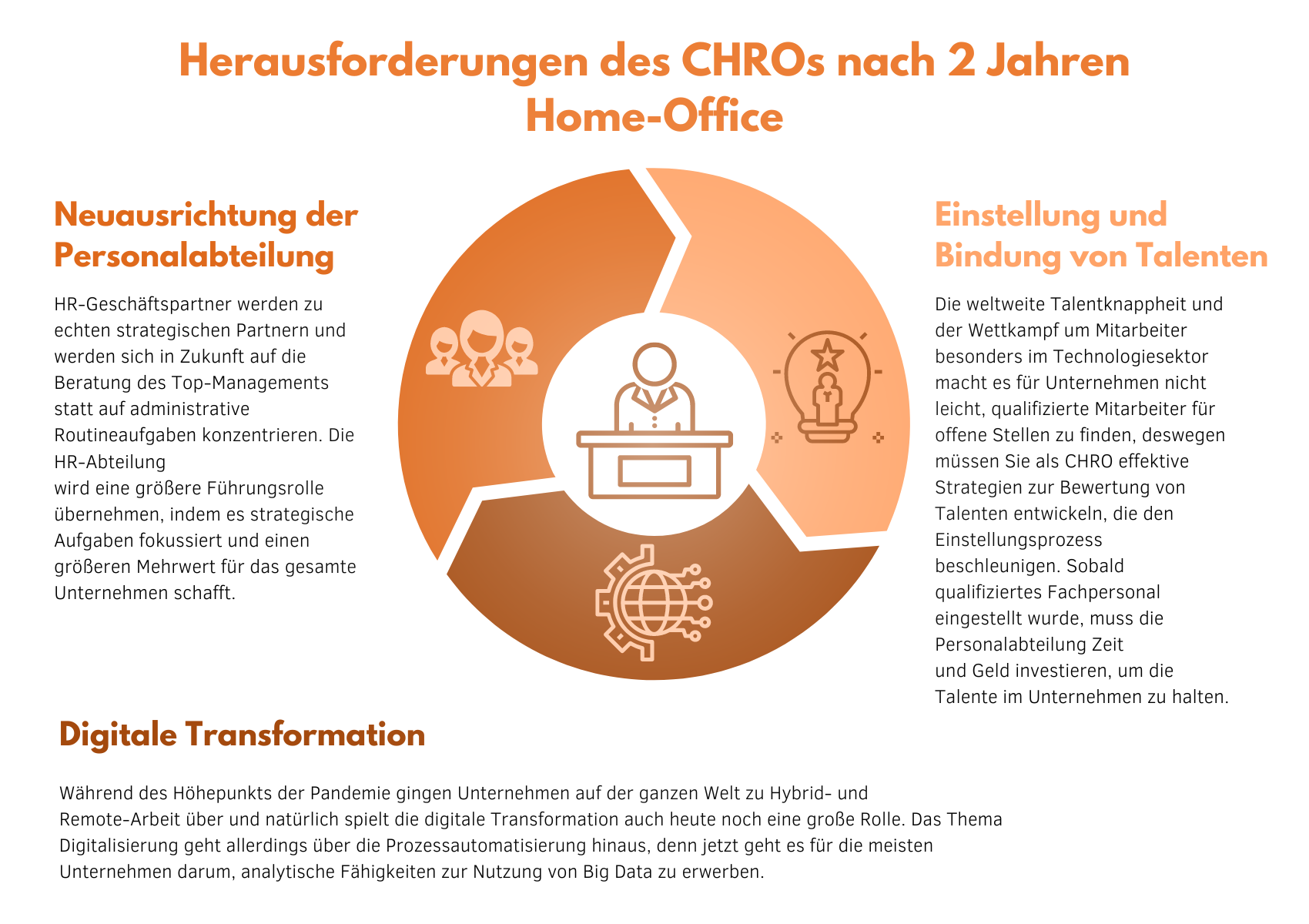The CHRO as a strategic partner
HR business partners are evolving into true strategic partners, focusing on advising top management rather than performing routine administrative tasks. These routine tasks will be automated or moved to platforms that employees can manage themselves.
The first step in the reorientation of HR could be to hand over responsibility for traditional HR tasks, such as performance appraisals, to line management. This will give HR the opportunity to take on a greater leadership role by focusing on strategic tasks and creating greater value for the whole organisation.
In 2022, HR will be taking on tasks that will provide a strategic advantage and that you, as a CHRO, should prioritise: hiring and retaining talent.
Talent acquisition
In a PwC survey, 61 per cent of CHROs say that investing in talent acquisition and retention will be one of the most important initiatives for their organisations in 2022.
The global talent shortage and competition for employees, especially in the technology sector, make it difficult for companies to find qualified candidates for open positions. As a CHRO, you need to develop effective talent assessment strategies that speed up the hiring process. This could include skills assessments or online interviews.
PwC's survey shows that 36 per cent of companies surveyed are partnering with colleges and universities to recruit skilled professionals. To attract a more diverse pool of candidates, 30 per cent of companies will increase the budget for training programmes and move from being talent seekers to talent providers. In addition, 23 per cent say they will change job titles or descriptions to highlight the value the company provides to its employees.
Talent retention
Once you've successfully attracted skilled professionals, it's important to invest time and money in retaining that talent within your organisation.
The key to reducing attrition is to develop leaders who communicate honestly and transparently with their employees, clearly articulating their vision and goals. So it makes sense to focus on internal career development and training this year. PwC's survey shows that 30 per cent of respondents plan to invest in training managers to lead remote teams. A further 35 per cent say they will improve communication between leaders and employees in 2022 to better communicate the company's vision to all stakeholders.
In a Gartner survey, 35 percent of HR professionals said they are investing in diversity, equity and inclusion, recognising it as a key component of corporate culture. Companies in virtually every industry are striving to create an inclusive work environment. There is increasing pressure from all stakeholders to make real progress in diversifying leadership teams.
PwC's survey reveals additional measures that companies will take to retain professionals within the organisation: 47 per cent will increase internal promotion opportunities and 39 per cent plan to introduce off-cycle salary increases or retention bonuses. However, compensation is now the most important factor in choosing a job for only one in five employees, according to a Umfrage von Bain & Company2.
Employee health should remain a priority in the coming year, as studies3 show that the pandemic has had a long-term and serious impact on the health of the workforce. Inefficient approaches to hybrid working models will only exacerbate these effects. Therefore, in 2022, organisations should ensure they have a sufficient budget for digitalisation, which brings us to our final challenge:
Digital Transformation
Digital transformation is one of the top priorities for HR in 2022, according to a McKinsey survey4. More than two-thirds of CHROs say their companies intend to invest in digital transformation initiatives, with nearly half of them increasing the automation of certain jobs.
Digital investments may include learning experience platforms that align your work culture with lifelong learning and employee appreciation. However, digitisation goes beyond process automation, as most companies are now focused on acquiring analytical capabilities to leverage big data.
expect some employees to continue to work remotely. This shift is forcing organisations, and HR in particular, to adopt a workforce model that allows employees to split their time between onsite and remote work, and to be more flexible about where and when they work.
During the height of the pandemic, companies around the world moved towards hybrid and remote working, with digital transformation playing a key role. While many companies are planning to return to the office in some form, this new trend is here to stay. The majority, 92 per cent of organisations surveyed by Gartner5 expect some employees to continue to work remotely. This shift is forcing organisations, and HR in particular, to adopt a workforce model that allows employees to split their time between onsite and remote work, and to be more flexible about where and when they work.
Flexibility in particular has become more important. According to one study6 86 per cent of respondents say that flexible working and remote working are effective ways of attracting and retaining talent.
Transforming HR and the role of the CHRO is not easy, but it's worth the effort. The shift from being a business partner to improving the employee experience is critical to the evolution of the HR operating model and will benefit not only you as a CHRO, but your entire organisation!
#Digitalisation #Retention #CHRO #Home Office #Talent Search


